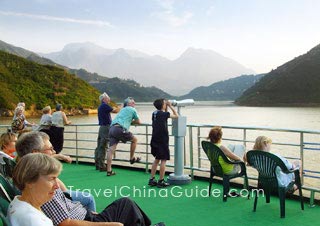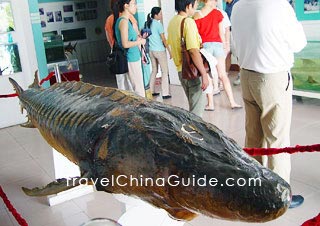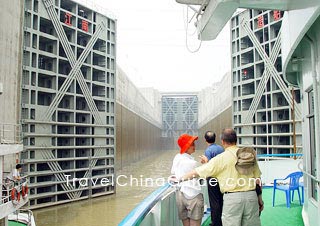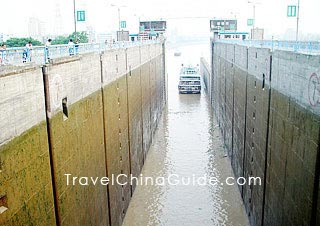Yichang Attractions - Things to Do
 |
| Xiling Gorge, Yichang |
Top Things to Do
![]() Three Gorges Dam Project
Three Gorges Dam Project![]() Gezhouba Water Conservancy Project
Gezhouba Water Conservancy Project![]() Three Gorges Tribe
Three Gorges Tribe![]() Chinese Sturgeon Museum
Chinese Sturgeon Museum![]() Qingjiang River Gallery
Qingjiang River Gallery![]() Qu Yuan's Hometown
Qu Yuan's Hometown
Yichang is a city with a god-given geographic location and natural resources. Here you will find grand mountains, historical relics, and water conservancy projects, fused by modern architecture, making an ideal place for holidays and leisure. When traveling here, you will be dazzled by the numerous attractions in and around Yichang.
The Yangtze River runs through the city of Yichang, creating many natural reserves along its path. This valuable resource has made the city a valuable territory, and for this reason it became a place contested by all strategists. Yichang was a famous battlefield throughout the Three Kingdoms Period (220-280). It is also the birth place of many historical celebrities, such as Qu Yuan and Wang Zhaojun.
Yangtze River is the longest river in China and the Three Gorges is the most magnificent gorge on the river. The Three Gorges was listed as one of the best natural landscapes of China. It starts from Baidi City in Chongqing and ends at Nanjin Pass of Yichang, running with 193 kilometers (120 miles) in length. It consists of three parts: Qutang Gorge, Wu Gorge and Xiling Gorge. The Three Gorges Dam Project, the world's most magnificent man-made construction feat, is located on the Xiling Gorge. Construction of the dam began in1993 and scheduled to end in 2009.
|
|
There are also many scenic landmarks around the Three Gorges area. Xiling Gorge is the longest of the three gorges. It is divided into four parts, marking specific areas that the Yangtze River turbulently passes through. Sailing down the Yangtze River, visitors can see beautiful scenery along both river banks. Zhao Jun's Hometown and Qu Yuan's Hometown are on the north bank of the river. Between Three Gorges Dam and Gezhouba Dam, there is a particularly beautiful area - Three Gorges Tribe (Sanxia Ren Jia), where visitors can enjoy scenery while having a taste of local life.
One branch of the Yangtze River, Qingjiang, is refered to as the 'bright pearl'. It is the mother river of the Tujia People, an area which acts as a receptacle for the water that the Yangtze empties into it. The Qingjiang River Gallery, named Qingjiang Hundred Islands Lake in the past, was rebuilt in 2005 and includes all the scenic spots from Geheyan Dam to Shuibuya Salt Pond Hot Spring. Visitors can take a yacht from Geheyan Port to view the scenery on both sides of the river, including Wuluo Zhongli Mountain, Qingjiang Buddha, Tianzhu Mountain Scenery Area and Hundred Islands Lake.
The area around Yichang City is highly forested, which creates many beautiful scenic areas in and around the city. Chexi Tujia Scenic Area to the west of the city, is an area where natural beauty and the folk custom of Tujia People have merged, creating a fascinating destination. Sixi River Scenic Area, located in the southeastern portion of Zigui County, is an area centered on the rivers. Some other attractive natural areas include Site of Changyang Man, Chexi Folk Scenic Area, Yuquan Temple Scenic Area and Dalaoling National Forest Park.
Changyang
 |
| Chinese Sturgeon Museum |
Anthropologists who studied these remains concluded that they belonged to early Homo sapiens who lived during mid Paleolithic age. These fossils had some characteristics of modern men and were more advanced compared to those of Beijing Man. The fossils proved that in early antiquity, humans had lived in the present Changyang area and in the area of the Yellow River. Yangtze River was also the cradle of the birth of civilization in China.
Chexi Folk Scenic Area: Located in Tucheng Town in Dianjun District of Yichang, Chexi Folk Scenic Area has been nicknamed "the Hometown of Dreams". There are eight tourist attractions: Shixian Valley, Lamei Gorge, Bachu Gutu Garden, Farmhouse Museum, Baota Valley, Tianlong Grotto, Wind Cave and Wangyou Valley. Visitors can enjoy Tujia ethnic folk songs and dancing, watch ancient workshop shows and farming displays in these picturesque settings.
Measuring about two miles long, Lamei Gorge was named for the fragrant calyx canthus (Chinese calls it Lamei) which blooms in winter. Wangyou Valley is located in the western end of Chexi Gorge. Wangyou, in English, means to forget sadness. The Taigong Cave inside the gorge is cool in summer and warm in winter. Zhenzhu (Pearl) waterfall cascades down like beads of pearls at the end of the valley. In Bachu Gutu Garden, there are demonstrations of Bachu culture and customs such as weaving, paper-making, extracting oil, ramming and grinding bean curd.
Come here to forget the hustle and bustle of city life in Yichang and be one with nature.
For visitors who want to get to know Yichang City, Chinese Sturgeon Museum gives an introduction to fossils which have lived on earth for 140 million years; Sanxia Fengqing Island, neighboring the museum, is a theme park with a view of Three Gorges.
- Last updated on Apr. 03, 2023 -

